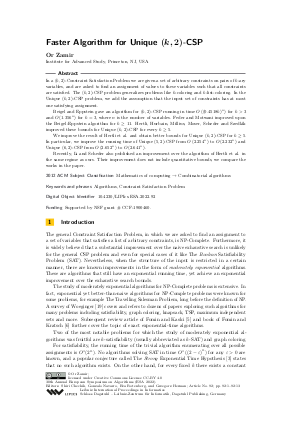Faster Algorithm for Unique (k,2)-CSP
Author Or Zamir
-
Part of:
Volume:
30th Annual European Symposium on Algorithms (ESA 2022)
Part of: Series: Leibniz International Proceedings in Informatics (LIPIcs)
Part of: Conference: European Symposium on Algorithms (ESA) - License:
 Creative Commons Attribution 4.0 International license
Creative Commons Attribution 4.0 International license
- Publication Date: 2022-09-01
File

PDF
LIPIcs.ESA.2022.92.pdf
- Filesize: 0.63 MB
- 13 pages
Document Identifiers
Subject Classification
ACM Subject Classification
- Mathematics of computing → Combinatorial algorithms
Keywords
- Algorithms
- Constraint Satisfaction Problem
Metrics
- Access Statistics
-
Total Accesses (updated on a weekly basis)
0Document
0Metadata
Abstract
In a (k,2)-Constraint Satisfaction Problem we are given a set of arbitrary constraints on pairs of k-ary variables, and are asked to find an assignment of values to these variables such that all constraints are satisfied. The (k,2)-CSP problem generalizes problems like k-coloring and k-list-coloring. In the Unique (k,2)-CSP problem, we add the assumption that the input set of constraints has at most one satisfying assignment.
Beigel and Eppstein gave an algorithm for (k,2)-CSP running in time O((0.4518k)^n) for k > 3 and O (1.356ⁿ) for k = 3, where n is the number of variables. Feder and Motwani improved upon the Beigel-Eppstein algorithm for k ≥ 11. Hertli, Hurbain, Millius, Moser, Scheder and Szedl{á}k improved these bounds for Unique (k,2)-CSP for every k ≥ 5.
We improve the result of Hertli et al. and obtain better bounds for Unique (k,2)-CSP for k ≥ 5. In particular, we improve the running time of Unique (5,2)-CSP from O (2.254ⁿ) to O (2.232^n) and Unique (6,2)-CSP from O (2.652^n) to O (2.641^n).
Recently, Li and Scheder also published an improvement over the algorithm of Hertli et al. in the same regime as ours. Their improvement does not include quantitative bounds, we compare the works in the paper.
Cite As Get BibTex
Or Zamir. Faster Algorithm for Unique (k,2)-CSP. In 30th Annual European Symposium on Algorithms (ESA 2022). Leibniz International Proceedings in Informatics (LIPIcs), Volume 244, pp. 92:1-92:13, Schloss Dagstuhl – Leibniz-Zentrum für Informatik (2022)
https://doi.org/10.4230/LIPIcs.ESA.2022.92
BibTex
@InProceedings{zamir:LIPIcs.ESA.2022.92,
author = {Zamir, Or},
title = {{Faster Algorithm for Unique (k,2)-CSP}},
booktitle = {30th Annual European Symposium on Algorithms (ESA 2022)},
pages = {92:1--92:13},
series = {Leibniz International Proceedings in Informatics (LIPIcs)},
ISBN = {978-3-95977-247-1},
ISSN = {1868-8969},
year = {2022},
volume = {244},
editor = {Chechik, Shiri and Navarro, Gonzalo and Rotenberg, Eva and Herman, Grzegorz},
publisher = {Schloss Dagstuhl -- Leibniz-Zentrum f{\"u}r Informatik},
address = {Dagstuhl, Germany},
URL = {https://drops.dagstuhl.de/entities/document/10.4230/LIPIcs.ESA.2022.92},
URN = {urn:nbn:de:0030-drops-170309},
doi = {10.4230/LIPIcs.ESA.2022.92},
annote = {Keywords: Algorithms, Constraint Satisfaction Problem}
}
Author Details
Funding
Supported by NSF grant # CCF-1900460.
References
-
Richard Beigel and David Eppstein. 3-coloring in time O(1.3289ⁿ). Journal of Algorithms, 54(2):168-204, 2005.

-
Andreas Björklund, Thore Husfeldt, and Mikko Koivisto. Set partitioning via inclusion-exclusion. SIAM Journal on Computing, 39(2):546-563, 2009.

-
Chris Calabro, Russell Impagliazzo, and Ramamohan Paturi. The complexity of satisfiability of small depth circuits. In International Workshop on Parameterized and Exact Computation, pages 75-85. Springer, 2009.

-
Tomás Feder and Rajeev Motwani. Worst-case time bounds for coloring and satisfiability problems. Journal of Algorithms, 45(2):192-201, 2002.

-
Fedor V Fomin and Petteri Kaski. Exact exponential algorithms. Communications of the ACM, 56(3):80-88, 2013.

-
F.V. Fomin and D. Kratsch. Exact Exponential Algorithms. Texts in Theoretical Computer Science. An EATCS Series. Springer Berlin Heidelberg, 2010.

-
Thomas Dueholm Hansen, Haim Kaplan, Or Zamir, and Uri Zwick. Faster k-SAT algorithms using biased-PPSZ. In Proceedings of the 51st Annual ACM SIGACT Symposium on Theory of Computing, pages 578-589, 2019.

-
Timon Hertli. 3-SAT faster and simpler - unique-SAT bounds for PPSZ hold in general. SIAM J. Comput., 43(2):718-729, 2014. Announced at FOCS'11.

-
Timon Hertli, Isabelle Hurbain, Sebastian Millius, Robin A Moser, Dominik Scheder, and May Szedlák. The ppsz algorithm for constraint satisfaction problems on more than two colors. In International Conference on Principles and Practice of Constraint Programming, pages 421-437. Springer, 2016.

-
Eugene L Lawler. A note on the complexity of the chromatic number problem, 1976.

- Liang Li, Xin Li, Tian Liu, and Ke Xu. From k-sat to k-csp: Two generalized algorithms. arXiv preprint, 2008. URL: http://arxiv.org/abs/0801.3147.
- Shibo Li and Dominik Scheder. Impatient ppsz-a faster algorithm for csp. arXiv preprint, 2021. URL: http://arxiv.org/abs/2109.02795.
-
Burkhard Monien and Ewald Speckenmeyer. Solving satisfiability in less than 2n steps. Discrete Applied Mathematics, 10(3):287-295, 1985.

- Ramamohan Paturi, Pavel Pudlák, Michael E. Saks, and Francis Zane. An improved exponential-time algorithm for k-SAT. In 39th Annual Symposium on Foundations of Computer Science, FOCS '98, pages 628-637, 1998. URL: https://doi.org/10.1109/SFCS.1998.743513.
-
Ramamohan Paturi, Pavel Pudlák, Michael E Saks, and Francis Zane. An improved exponential-time algorithm for k-SAT. Journal of the ACM (JACM), 52(3):337-364, 2005.

- Dominik Scheder. Ppz for more than two truth values-an algorithm for constraint satisfaction problems. arXiv preprint, 2010. URL: http://arxiv.org/abs/1010.5717.
-
T Schoning. A probabilistic algorithm for k-SAT and constraint satisfaction problems. In 40th Annual Symposium on Foundations of Computer Science (Cat. No. 99CB37039), pages 410-414. IEEE, 1999.

-
Patrick Traxler. The time complexity of constraint satisfaction. In International Workshop on Parameterized and Exact Computation, pages 190-201. Springer, 2008.

-
Gerhard J Woeginger. Exact algorithms for NP-hard problems: A survey. In Combinatorial optimization - eureka, you shrink!, pages 185-207. Springer, 2003.

-
Or Zamir. Breaking the 2ⁿ barrier for 5-coloring and 6-coloring, 2020.

